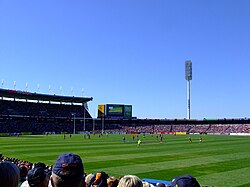| Team | Nickname | League | Qualification | Participation (bold indicates winners) 1 |
|---|
| Enter in Round 1 |
|---|
| Carlton | Blues | VFL | Winners of the 1981 Victorian Football League | 11th (Previous: 1907, 1908, 1914, 1968 , 1970 , 1972, 1976, 1979, 1980, 1981) |
| Collingwood | Magpies | VFL | Runners-Up in the 1981 Victorian Football League | 6th (Previous: 1896 , 1910, 1979 , 1980, 1981) |
| Geelong | Cats | VFL | Third Place in the 1981 Victorian Football League | 4th (Previous: 1979, 1980, 1981) |
| Fitzroy | Lions | VFL | Fourth Place in the 1981 Victorian Football League | 5th (Previous: 1913, 1979, 1980, 1981) |
| Essendon | Bombers | VFL | Fifth Place in the 1981 Victorian Football League | 6th (Previous: 1893 , 1911, 1979, 1980, 1981 ) |
| Hawthorn | Hawks | VFL | Sixth Place in the 1981 Victorian Football League | 6th (Previous: 1971 , 1976 , 1979, 1980, 1981) |
| Richmond | Tigers | VFL | Seventh Place in the 1981 Victorian Football League | 8th (Previous: 1969 , 1973 , 1974 , 1976, 1979, 1980, 1981) |
| North Melbourne | Kangaroos | VFL | Eighth Place in the 1981 Victorian Football League | 6th (Previous: 1975 , 1976, 1979, 1980 , 1981) |
| South Melbourne | Swans | VFL | Ninth Place in the 1981 Victorian Football League | 7th (Previous: 1888, 1890, 1909 , 1979, 1980, 1981) |
| St Kilda | Saints | VFL | Tenth Place in the 1981 Victorian Football League | 4th (Previous: 1979, 1980, 1981) |
| Footscray | Bulldogs | VFL | Eleventh Place in the 1981 Victorian Football League | 5th (Previous: 1976, 1979, 1980, 1981) |
| Melbourne | Demons | VFL | Twelfth Place in the 1981 Victorian Football League | 4th (Previous: 1979, 1980, 1981) |
| Port Adelaide | Magpies | SANFL | Winners of the 1981 South Australian National Football League | 11th (Previous: 1890 , 1910 , 1913 , 1914 , 1976, 1977, 1978, 1979, 1980, 1981) |
| Claremont | Tigers | WAFL | Winners of the 1981 West Australian Football League | 5th (Previous: 1977, 1979, 1980, 1981) |
| Enter in Qualifying round |
|---|
| Glenelg | Tigers | SANFL | Runners-Up in the 1981 South Australian National Football League | 8th (Previous: 1973, 1976, 1977, 1978, 1979, 1980, 1981) |
| Norwood | Redlegs | SANFL | Third Place in the 1981 South Australian National Football League | 10th (Previous: 1888 , 1907 , 1975, 1976, 1977 , 1978, 1979, 1980, 1981) |
| South Fremantle | Bulldogs | WAFL | Runners-Up in the 1981 West Australian Football League | 6th (Previous: 1976, 1977, 1979, 1980, 1981) |
| Swan Districts | Swans | WAFL | Third Place in the 1981 West Australian Football League | 5th (Previous: 1976, 1979, 1980, 1981) |
|


